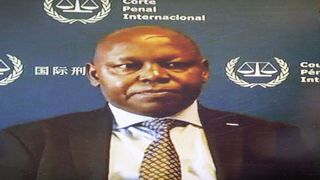
Kenyan lawyer Paul Gicheru makes his first appearance before the ICC on November 6, 2020, before Judge Reine Adélaïde Sophie Alapini-Gansou of Pre-Trial Chamber A.
| Pool | AFPNews
Premium
ICC demands Kenya’s word on lawyer Paul Gicheru's case
What you need to know:
- The judge extended the invitation after dismissing arguments by the Kenyan government.
- The government will also be required to give certain undertakings "to enforce one or more conditions restricting liberty.
The International Criminal Court (ICC) has renewed lawyer Paul Gicheru’s hopes of securing a conditional release from detention after it asked Kenya to once again submit its views on his request to return to the country.
In an order issued by Pre-Trial Chamber presiding judge Reine Adélaïde Sophie Alapini-Gansou, the Kenyan government has until January 20 to re-submit its observations on the matter, so as to assist the court in making a decision on Mr Gicheru's request.
The judge extended the invitation after dismissing arguments by the Kenyan government that it will not cooperate with ICC on Mr Gicheru's case since he went against “a binding decision” of the High Court dated November 16, 2017.
Attorney-General Paul Kihara Kariuki had explained to ICC that the High Court had frozen the ICC’s arrest warrants issued against Mr Gicheru and his co-accused Phillip Kipkoech Bett on allegations of witness tampering.
Failed to comply
Mr Kariuki had also stated that Mr Gicheru failed to comply with the International Crimes Act that required him to notify the High Court in Nairobi before he surrendered to the ICC. The Act domesticated the Rome Statute that establishes the ICC.
But judge Alapini-Gansou said Kenya's observations were not reflecting the current state of affairs in relation to the interim release request by Mr Gicheru.
The chamber found that after surrendering to the ICC, Mr Gicheru communicated to the High Court of Kenya that he consents to be surrendered to the international court, in compliance with Section 41 of Kenya’s International Crimes Act.
The judge asked Kenya to submit once again its observations, specifically as to its willingness and ability to facilitate Mr Gicheru travelling between Kenya and the Netherlands for the purposes of the proceedings in the present case.
Rome Statute
The judge noted that Nairobi has an obligation, as a State Party to the Rome Statute, to cooperate fully with the ICC in accordance with article 86 of the Statute.
The government will also be required to give certain undertakings "to enforce one or more conditions restricting liberty the Chamber could potentially impose."
The conditions include the requirement that Mr Gicheru will not be allowed to travel outside Kenya without the explicit agreement of the Chamber, and that he must not go to certain places or associate with certain persons as specified by the Pre-Trial Chamber.
Further, that he must not contact directly or indirectly victims or witnesses, that he must not engage in certain professional activities, that he must reside at a particular address as specified by the Pre-Trial Chamber, and that he must respond when summoned by an authority or a qualified person designated by the Pre-Trial Chamber.
The judge agreed with the Court's prosecutor Fatou Bensouda that issues pertaining the enforcement of conditions in relation to interim release are distinct from matters related to surrender under domestic law.
In her submissions, the prosecutor said that the ruling of the High Court of Kenya, upon which Kenya relies in its observations, misapprehends the admissibility regime applicable to Article 70 on offences, which involve ICC’s administration of justice.
"Since Mr Gicheru has subsequently travelled to the seat of the Court of his own accord and voluntarily surrendered, the decision of the High Court is also now moot," said the prosecutor.
In any event, she said the High Court decision does not constitute a bar to Kenya’s enforcement of any of the conditions of interim release.
The prosecutor also said that Mr Gicheru has now communicated his consent to surrender in compliance with Section 41 of Kenya’s International Crimes Act, which should lead to the removal of any perceived impediment to the enforcement of the conditions of his interim release.
She added that to the extent that Kenya still regards the High Court decision as binding, notwithstanding Mr Gicheru’s waiver, Kenya “should provide reasons why the ex parte decision should be reconsidered, or confirm that it accepts the ruling as authoritative”.
On November 30, 2020, the defence requested the Division of External Operations to submit Mr Gicheru’s signed consent to be surrendered to the court and a letter requesting Kenya’s reconsideration (of the refusal to cooperate) to the Attorney General.
The defence added that Kenya misapprehends the admissibility regime for Article 70 cases.
Witness tampering
Mr Gicheru surrendered to the ICC on November 2, 2020 after nearly five years as a fugitive following his indictment for alleged witness tampering in the case against Deputy President William Ruto.
He insisted that he surrendered on his own volition.
"I wish to confirm to this court that I surrendered myself first to the Dutch authorities, then to the court. This surrender was without coercion or urging from anybody. I did it on my own volition and at my cost," he said.
He serves as the chairman of the Export Processing Zones Authority (EPZA).
The ICC prosecutor accuses him of corruptly influencing six witnesses who were set to testify against Dr Ruto by paying bribes and drawing affidavits they used to recant their testimony to the ICC.



